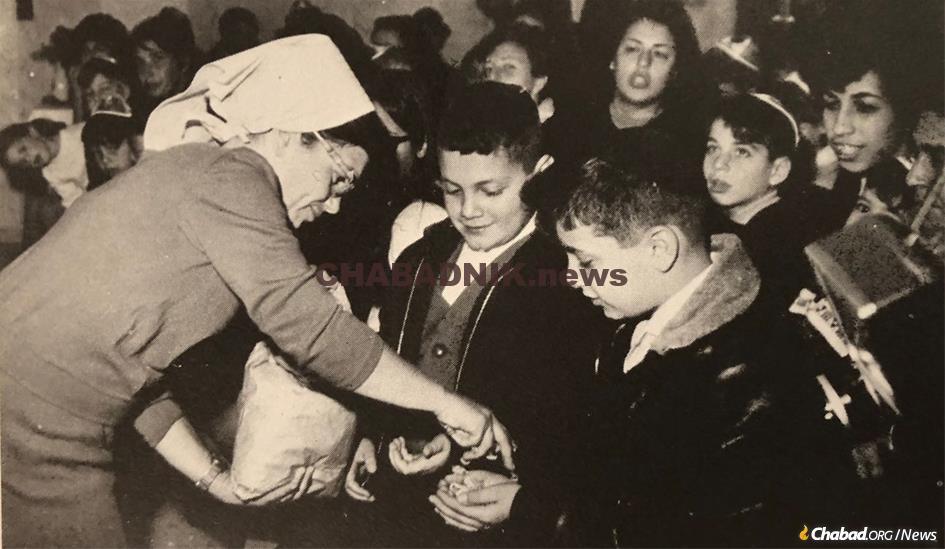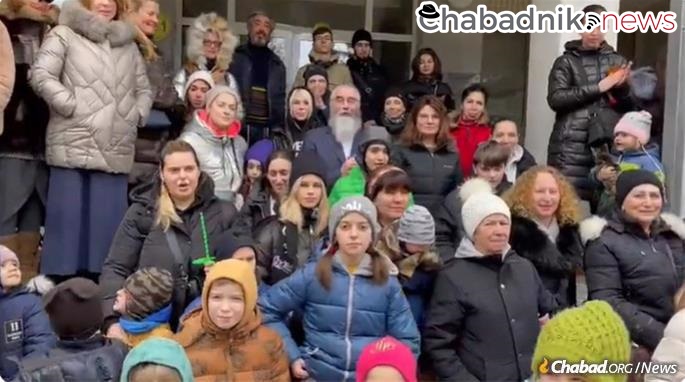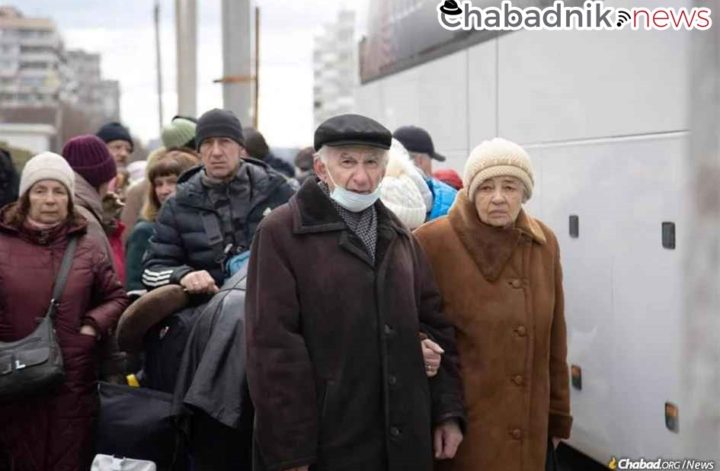Shifra Marasow (Golombovitz) was the mother of three (including a newborn) in July 1967 when she got the news that her husband had lost his life defending Israel in the aftermath of the Six-Day War. In the years that followed, she went on to care for hundreds of widows and orphans, devoting herself to their every need. Even as her work gained acclaim from military and civilian leaders, she remained the humble “Shifra from Kfar Chabad,” who knocked on doors and made sure that there was food in pantries all over the country. She continues to serve others from her home in Kfar Chabad.
The following interview by Fradie Brod, was originally printed in Mishpacha Chasidit, the family section of Kfar Chabad magazine.
How did you become involved with the wives and children of Israel’s fallen soldiers?
My first connection with the families of Israel’s heroes began with a letter that the Rebbe—Rabbi Menachem M. Schneerson, of righteous memory—had written after the Six-Day War. Rabbi Yitzchak (“Itchke”) Gansburg, who was then active in Lubavitch Youth Organization, had received a letter from the Rebbe asking him to care for the families of the brave men and women who had fallen in the war. He explained that even if some of them had not been particularly observant during their lifetimes, their souls are now begging that their children be brought to Torah.
When Reb Itchke got that letter, he was not sure how to proceed, since this was not something he had been involved in.
His wife, Gita, suggested that he turn to me.
Only two weeks prior, on Shabbat, 30 Sivan (July 8), my husband, David, had fallen in battle at the Suez Canal. After we finished the customary shiva mourning, I went to visit a woman from Givat Brenner, whose husband was a dear comrade of David’s, who had died together with him.
This woman, who is still a good friend of mine, was then pregnant with her first child. When I came to visit her, she said, “It is easier for you—you have your faith!”
That visit showed me that it is possible to lighten the burden of the wives of the heroes (we are particular not to call them “war widows”) through visiting and friendship.
When I heard of the Rebbe’s request, I saw it as an opportunity to turn my tragedy into something positive, for me to be there for struggling families. I accepted the Rebbe’s challenge.
How do you begin the conversation?

You want to know how to enter a house where there is so much pain? The first thing I would generally say is shalom, “hello,” and things would flow naturally from there.
At times, I would just tell the woman, “I happened to be in the area, I know that you live here, and I wanted to know how you are managing with the children.”
One time, a woman really opened up to me, pouring out her entire heart. As the visit progressed she spoke about all the hardships she faced on a daily basis, her children, her extended family and so on. When she finished, she turned to me and said, “So I just went on and on. Good, now you can go home to your husband and tell him everything I told you, and you can have a good laugh together at my expense.”
“You are right,” I told her, “I am going home, but I will not be speaking to my husband.” When I told her that I, too, had lost my husband in battle, all barriers fell away, and we developed a very warm and strong bond.
I always tried to enter the mindset of the woman I was visiting.
I’ll give you one extreme example. We once came to the house of a woman with six children. A primitive gas burner sat on the floor, and poverty was screaming from every corner of her home. It was a depressing sight. I was afraid she may view me as a social worker or another government-appointed intruder.
What did I do? I sat next to her and said, “Are you from Persia? Tell me, how do you make your rice? I’ve tried so many times to make rice, and every time it mushes together like porridge. How do you keep the grains from sticking together?”
Her eyes lit up, and she gave me step-by-step instructions for rice. Once we established that we were both just regular women trying to care for our children, we were able to connect. The end of the story was that she asked for my advice regarding which school to send her children to, and I was able to point her to a school where Torah and Judaism were taught.
The trick is not to come as a superior, but to meet each person at eye level.

The Sukkot Tour That Almost Ended in Disaster
For the first Sukkot after the war, we arranged a tour for our women, two buses full. We began at Gush Etzion, continued to Hebron, and from there to the Kotel.
At Gush Etzion, we were greeted by the future Member of Knesset Hanan Porat, whose parents had been among the original pioneers of Kfar Etzion. During the War of Independence, he was evacuated along with the other children to Jerusalem. He served as a paratrooper during the war and had participated in the liberation of Jerusalem. After the war, he was among the first Jews to move back to Gush Etzion. You can imagine that the place was still pretty bare, but they greeted us exceptionally warmly with the little they had.
They took a metal trough from a chicken coop and somehow made it into a table that they filled with fruit, and Porat began to speak. I don’t know how much time we had budgeted for his talk, but he just kept on talking well past the allotted time. I tried to discreetly point to the clock, but he ignored me.
This turned out to be a great miracle. We could not have known it, but at that very moment there had been an attack in Hebron. By the time we arrived, it was all over, and we saw jeeps transporting the wounded to the hospital.
This was a great miracle, but for us, it was a unique challenge. Our women had suffered great traumas very recently and panic set in. They began clamoring to be taken home immediately.
Even when we arrived at the Kotel, they refused to get out of the buses, insisting that they be taken home.
I saw that our entire carefully-planned trip was about to fall apart and said: “OK ladies. Anyone who does not want to get off the bus needs to sponsor ice-cream for the group.” That did the trick, and everyone lightened up a bit, got off the buses and walked to the newly liberated Kotel.
The image stays with me until this day. It was an awe-inspiring sight. Many of the women were wearing black, and people were asking me, “Who is this delegation?” and I did not know how to reply.
The most significant results of that trip were the friendships that the women formed between themselves. They sat on the buses and chatted about their kids, their struggles, the challenges, everything—and they gave each other a supporting shoulder upon which to cry. Everyone had someone to listen to her and understand.
Those friendships continued to blossom, and there are actually children from these families who have married each other as a result of the connections made on that trip.




6 Comments
Very nice post and right to the point. I don’t know if this is really the best place to ask but do you guys have any ideea where to hire some professional writers? Thanks in advance 🙂 https://arthritismedi.com best over the counter arthritis medication https://arthritismedi.com/
You got a very great website, Gladiola I observed it through google. https://hcvmedi.com buy HCV drugs https://hcvmedi.com/
I am always searching online for articles that can help me. Thank you! https://alzheimermedi.com medication for alzheimer disease https://alzheimermedi.com/
I am always searching online for articles that can help me. Thank you! https://myastheniamedi.com myasthenia gravis med list https://myastheniamedi.com/
Great site. A lot of useful information here. I’m sending it to some pals ans also sharing in delicious. And of course, thank you for your effort! https://cancermedph.com precision cancer medicine https://cancermedph.com/
You got a very good website, Glad I found it through google. https://atherosclerosismed.com drugs to treat atherosclerosis https://atherosclerosismed.com/